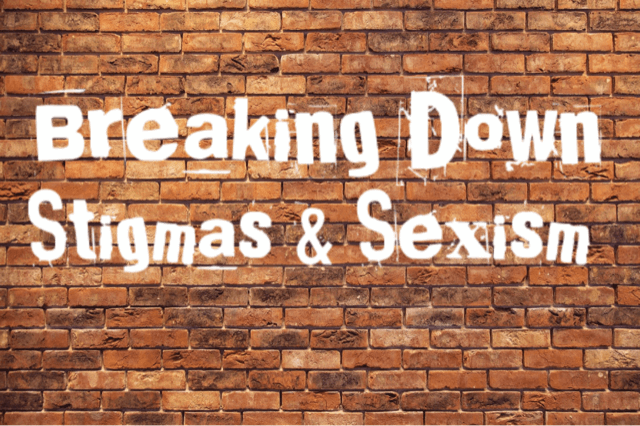There are many stigmas that need to be broken in the Christian tradition. The stigma of divorce in the Christian community is a phenomenon where folks are, after much pain and heartache, retraumatized and relegated to a second-class-citizen type of Christian and branded as damaged goods, a failure, or both. This trend of indelible marking is beginning to change culturally, but we have much further to go to truly begin to treat the brokenness of relationships with honor, tenderness, and care.
I think of my own origin story over 30 years ago. My mother escaped from an abusive relationship with my father, heroically taking sole responsibility for my two siblings and me and moved three states away to be closer to her support system. The judgment and condemnation she endured being a single mother in a conservative church context were incredibly painful and harsher than anything she felt from the outside world. Why was the church the harshest place of judgment rather than a place of deepest care? Author John Pavlovitz says, “I refuse to be a Christian who is generous with damnation and stingy with grace.” My mom deserved applause for simply getting out of bed in the morning, for the feat of tying her shoes, the miracle that she got 3 kids to church who were all fully clothed! Yes, this was a victory that needed to not only be seen and acknowledged but wildly celebrated! Instead, there was an elderly woman whose eyes were hot with a stale and false sense of justice, wagging her finger in my mother’s face saying, “Your children need their father!” Sitting in the wooden pew, she would hear hushed comments from behind, “I can’t believe she let her child wear shorts to church!” Holy Hell! My mother had just suffered the nuclear bomb of my father’s infidelity and two decades of secret behavior and addiction, but somehow because she allowed us to wear shorts to church, we were all destined for eternal damnation? Truly an adventure in missing the point.
Does suffering have no place in the church? What if authentic suffering was understood as a prerequisite for attending church? What if those who are the walking wounded in our midst could find rest and restoration in the arms of those who profess the highest of love? Abigail Van Buren once said, “The Church is a hospital for sinners, not a museum for saints”. I can think of no better words to describe how the posture of the church should be–an extension of Jesus, radically loving the outcasts, the women, the orphans, the sexually abused, the divorced, yes, even the perpetrators of such violence have access to healing in God’s Kingdom. There is no disgrace or shame too strong for Jesus not to shatter.
Jesus modeled the breaking down of stigmas and social strongholds in John 4:1-42 with the woman at the well. At that time, Jewish men were not permitted to even talk with Samaritan women in public. The woman wonders aloud in verse 9, “How can you, a Jew, ask me, a Samaritan woman, for a drink?” Jesus ignores social barriers, demonstrating the truth that all are equal. The cultural norm at the time was to view women as unclean as described so eloquently in the ancient Jewish texts: “menstruants from the cradle”.( Mishnah, Niddah 4:1) Patriarchy and misogyny were thick in Jesus’ day, and it is in this cultural context that we see how radical this story of Jesus is.
Dr. Matthew Williams points out this woman was an “outcast within the outcasts”. He states, “The Samaritans would be labeled as unclean by Jewish people. And, the Samaritan woman would also be labeled as an unclean sinner by the Samaritans themselves. Thus, she was an outcast within the outcasts. Rejected by the Jewish people; rejected by her own people; apparently even rejected by her five husbands, she was unclean and carried shame around with her every day of her life. Perhaps that is why she came to the water well—alone—in the middle of the day.” Yet Jesus treats her no differently than if he were there with King Herod himself. He invites this outcast into a deep intimacy by asking for a drink (John 4:1–42) He actually shared spit with an “unclean” woman! The prevailing thought of the day was that this act alone would literally send a person to Hell. Theologian Angela Meyer writes, “The rabbinic warning against contact with women of any kind was extreme: “He who talks much with womankind brings evil on himself. He neglects the study of the Law and at the last will inherit Gehenna.” If speaking with a woman can cast one into Gehenna, how much more will drinking from the same cup? According to Jewish rules, “The spittle of a menstruant was contaminating to a very high degree.”
What would it look like for us to follow Jesus’s lead on how we engage those who have experienced the heartache of divorce? Abuse? Infidelity?
Sexism & Stigma are FWBs
Sexism and social stigmas are FWBs (To clarify, FWB stands for “Friends with Benefits” for my more mature readers.) They are completely intertwined and use each other to support their toxic dogmas and relationship. Sadly, this impacts women much more deeply in our Christian communities than men.
My friend and writer Rose Gwynn pointed out:
“Sexism and stigma are related because men often are more easily forgiven and more marriable than women after a divorce. Women are disproportionately affected by the stigmas around divorce. In the same way that when a man loses his virginity he’s a cultural stud but a woman is just a dirty whore, we see this type of dynamic play out in the ending of a marriage. The man now has experience and maturity, but the woman is used up, and has usually sacrificed her youth, beauty, and body to bear children and care for them.”
I think she is onto something. I know if I am honest about my own biases, I think differently about a single father vs. a single mother. Are you aware of your own internalized sexism?
Though this story of Jesus and the woman at the well is notoriously known, many have grossly misinterpreted its meaning to fit into their unconscious sexist view of women. We must allow Jesus’s example to guide us into the way we live, honor women, and deeply love those who are on the fringes of our faith, we have framed it quite the opposite. A common interpretation is that a “prostitute” (notice you rarely hear the term “prostituted woman”, which would put the onus on the man) who lacks morality meets Jesus and, Tada! she is now a redeemed and virtuous Proverbs 31 woman!
Meyer points out, “She could have been widowed or divorced… While obvious tensions existed between the Jewish and Samaritan communities, their laws were derived from the same ‘Pentateuch Jewish law of the pre-oral law period.’” The Jewish Women’s Archive reports that Jewish law on divorce is derived from Deuteronomy 24:1:
A man takes a wife and possesses her. She fails to please him because he finds something obnoxious about her, and he writes her a bill of divorcement, hands it to her and sends her away from his house.
For any reason at all, men could divorce their wives! Meyer goes onto say maybe she was “barren”, and surely would have been stoned to death just like a few chapters later in John 8:1-11.
This is a perfect example of how a patriarchal society skews our view of women and leads us to mistreat and place unfair stigmas on those who are hurting and need our love and embrace. The woman at the well is another example of a courageous act of faith by a brilliant, strong woman who was oppressed and subjugated in her own culture, yet had the power and fortitude to stand toe to toe with the son of God and have a theological debate! Jesus displays a wildly scandalous love and honor of women regardless of their relationship or social status. Will you have the courage to do the same? Will you speak up against sexism, both outwardly and internally, and disrupt the oppression of a part of the image of God that has been silenced for far too long?






